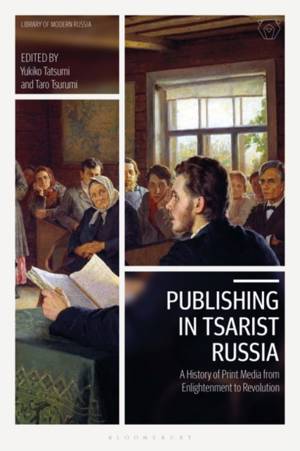
Je cadeautjes zeker op tijd in huis hebben voor de feestdagen? Kom langs in onze winkels en vind het perfecte geschenk!
- Afhalen na 1 uur in een winkel met voorraad
- Gratis thuislevering in België vanaf € 30
- Ruim aanbod met 7 miljoen producten
Je cadeautjes zeker op tijd in huis hebben voor de feestdagen? Kom langs in onze winkels en vind het perfecte geschenk!
- Afhalen na 1 uur in een winkel met voorraad
- Gratis thuislevering in België vanaf € 30
- Ruim aanbod met 7 miljoen producten
Zoeken
Publishing in Tsarist Russia
A History of Print Media from Enlightenment to Revolution
€ 228,95
+ 457 punten
Omschrijving
According to Benedict Anderson, the rapid expansion of print media during the late-1700s popularised national history and standardised national languages, thus helping create nation-states and national identities at the expense of the old empires. Publishing in Tsarist Russia challenges this theory and, by examining the history of Russian publishing through a transnational lens, reveals how the popular press played an important and complex Imperial role, while providing a "soft infrastructure" which the subjects could access to change Imperial order.
As this volume convincingly argues, this is because the Russian language at this time was a lingua franca; it crossed borders and boundaries, reaching speakers of varying nationalities. Russian publications, then, were able to effectively operate within the structure of Imperialism but as a public space, they went beyond the control of the Tsar and ethnic Russians.
This exciting international team of scholars provide a much-needed, fresh take on the history of Russian publishing and contribute significantly to our understanding of print media, language and empire from the 18th to 20th centuries. Publishing in Tsarist Russia is therefore a vital resource for scholars of Russian history, comparative nationalism, and publishing studies.
As this volume convincingly argues, this is because the Russian language at this time was a lingua franca; it crossed borders and boundaries, reaching speakers of varying nationalities. Russian publications, then, were able to effectively operate within the structure of Imperialism but as a public space, they went beyond the control of the Tsar and ethnic Russians.
This exciting international team of scholars provide a much-needed, fresh take on the history of Russian publishing and contribute significantly to our understanding of print media, language and empire from the 18th to 20th centuries. Publishing in Tsarist Russia is therefore a vital resource for scholars of Russian history, comparative nationalism, and publishing studies.
Specificaties
Betrokkenen
- Uitgeverij:
Inhoud
- Aantal bladzijden:
- 280
- Taal:
- Engels
- Reeks:
Eigenschappen
- Productcode (EAN):
- 9781350109339
- Verschijningsdatum:
- 20/02/2020
- Uitvoering:
- Hardcover
- Formaat:
- Genaaid
- Afmetingen:
- 156 mm x 234 mm
- Gewicht:
- 571 g

Alleen bij Standaard Boekhandel
+ 457 punten op je klantenkaart van Standaard Boekhandel
Beoordelingen
We publiceren alleen reviews die voldoen aan de voorwaarden voor reviews. Bekijk onze voorwaarden voor reviews.








